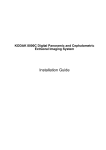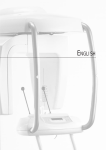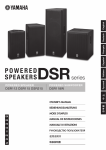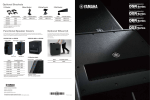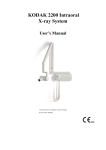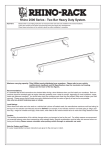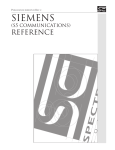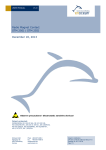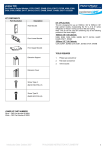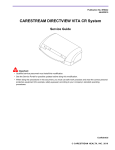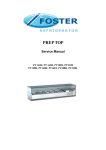Download Kodak 9000 3D install guide
Transcript
KODAK 9000 3D Extraoral Imaging System Installation Guide Notice Congratulations on your purchase of the KODAK 9000 3D Extraoral Imaging System. Thank you for your confidence in our products and we will do all in our power to ensure your complete satisfaction. The Installation Guide for the KODAK 9000 3D Extraoral Imaging System includes information both on the Panoramic features as well as the 3D features. If you have purchase only the KODAK 9000 Panoramic system, information relevant to 3D does not apply to your radiological system. We recommend that you thoroughly familiarize yourself with this Guide in order to make the most effective use of your system. The information contained in this Guide may be subject to modification without notice, justification or notification to the persons concerned. No part of this Guide may be reproduced without the express permission of Carestream Health, Inc. This document is originally written in English. Manual Name: KODAK 9000 3D Extraoral Imaging System Installation Guide Part Number: SM711 Revision Number: Edition 01 Print Date: 12/2007 The brand names and logos reproduced in this Guide are copyright. KODAK is a trademark of KODAK used under License. KODAK 9000 3D Extraoral Imaging System, complies with Directive 93/42/CEE relating to medical equipment. 0086 Contents 1—About This Guide Conventions in this Guide . . . . . . . . . . . . . . . . . . . . . . . . . . . . . . . . . . . . . . . . . . . . . . . . . . . . . . . . . . . . . . . . . . . . . . . 1–1 Note to the User. . . . . . . . . . . . . . . . . . . . . . . . . . . . . . . . . . . . . . . . . . . . . . . . . . . . . . . . . . . . . . . . . . . . . . . . . . . . . . . 1–2 Warning and Safety Instructions . . . . . . . . . . . . . . . . . . . . . . . . . . . . . . . . . . . . . . . . . . . . . . . . . . . . . . . . . . . . . . . . . . 1–2 Marking and Labeling Symbols . . . . . . . . . . . . . . . . . . . . . . . . . . . . . . . . . . . . . . . . . . . . . . . . . . . . . . . . . . . . . . . . . . 1–4 Responsibility and Warranty . . . . . . . . . . . . . . . . . . . . . . . . . . . . . . . . . . . . . . . . . . . . . . . . . . . . . . . . . . . . . . . . . . . . . 1–5 2—KODAK 9000 3D DIGITAL IMAGING UNIT OVERVIEW Functional Overview . . . . . . . . . . . . . . . . . . . . . . . . . . . . . . . . . . . . . . . . . . . . . . . . . . . . . . . . . . . . . . . . . . . . . . . . . . . 2–1 Control Panel Overview . . . . . . . . . . . . . . . . . . . . . . . . . . . . . . . . . . . . . . . . . . . . . . . . . . . . . . . . . . . . . . . . . . . . . . . . 2–4 X-Ray Remote Control Overview. . . . . . . . . . . . . . . . . . . . . . . . . . . . . . . . . . . . . . . . . . . . . . . . . . . . . . . . . . . . . . . . . 2–5 3—KODAK 9000 3D PACKAGING Standard Packaging . . . . . . . . . . . . . . . . . . . . . . . . . . . . . . . . . . . . . . . . . . . . . . . . . . . . . . . . . . . . . . . . . . . . . . . . . . . . 3–1 Head Assembly . . . . . . . . . . . . . . . . . . . . . . . . . . . . . . . . . . . . . . . . . . . . . . . . . . . . . . . . . . . . . . . . . . . . . . . . . . . . . . . 3–2 Box (A) Components . . . . . . . . . . . . . . . . . . . . . . . . . . . . . . . . . . . . . . . . . . . . . . . . . . . . . . . . . . . . . . . . . . . . . . . 3–2 Box (B) Components . . . . . . . . . . . . . . . . . . . . . . . . . . . . . . . . . . . . . . . . . . . . . . . . . . . . . . . . . . . . . . . . . . . . . . . 3–3 Column Assembly . . . . . . . . . . . . . . . . . . . . . . . . . . . . . . . . . . . . . . . . . . . . . . . . . . . . . . . . . . . . . . . . . . . . . . . . . . . . . 3–5 4—SITE PREPARATION BEFORE INSTALLATION Standard Compliance . . . . . . . . . . . . . . . . . . . . . . . . . . . . . . . . . . . . . . . . . . . . . . . . . . . . . . . . . . . . . . . . . . . . . . . . . . 4–1 Environmental Requirements . . . . . . . . . . . . . . . . . . . . . . . . . . . . . . . . . . . . . . . . . . . . . . . . . . . . . . . . . . . . . . . . . . . . 4–1 Unit Dimensions . . . . . . . . . . . . . . . . . . . . . . . . . . . . . . . . . . . . . . . . . . . . . . . . . . . . . . . . . . . . . . . . . . . . . . . . . . . . . . 4–2 Electrical Requirements . . . . . . . . . . . . . . . . . . . . . . . . . . . . . . . . . . . . . . . . . . . . . . . . . . . . . . . . . . . . . . . . . . . . . . . . 4–3 X-Ray Room Requirement . . . . . . . . . . . . . . . . . . . . . . . . . . . . . . . . . . . . . . . . . . . . . . . . . . . . . . . . . . . . . . . . . . . . . . 4–7 PC System Requirements . . . . . . . . . . . . . . . . . . . . . . . . . . . . . . . . . . . . . . . . . . . . . . . . . . . . . . . . . . . . . . . . . . . . . . . 4–9 5—INSTALLING THE KODAK DENTAL IMAGING SOFTWARE 6—INSTALLING THE UNIT Tool Requirements . . . . . . . . . . . . . . . . . . . . . . . . . . . . . . . . . . . . . . . . . . . . . . . . . . . . . . . . . . . . . . . . . . . . . . . . . . . . 6–1 Technical Staff Requirements . . . . . . . . . . . . . . . . . . . . . . . . . . . . . . . . . . . . . . . . . . . . . . . . . . . . . . . . . . . . . . . . . . . . 6–1 Opening the Boxes . . . . . . . . . . . . . . . . . . . . . . . . . . . . . . . . . . . . . . . . . . . . . . . . . . . . . . . . . . . . . . . . . . . . . . . . . . . . 6–2 Installing the Unit . . . . . . . . . . . . . . . . . . . . . . . . . . . . . . . . . . . . . . . . . . . . . . . . . . . . . . . . . . . . . . . . . . . . . . . . . . . . . 6–4 Installing the Column . . . . . . . . . . . . . . . . . . . . . . . . . . . . . . . . . . . . . . . . . . . . . . . . . . . . . . . . . . . . . . . . . . . . . . . 6–4 Installing the Head . . . . . . . . . . . . . . . . . . . . . . . . . . . . . . . . . . . . . . . . . . . . . . . . . . . . . . . . . . . . . . . . . . . . . . . . . 6–6 Installing the Fixed Arm. . . . . . . . . . . . . . . . . . . . . . . . . . . . . . . . . . . . . . . . . . . . . . . . . . . . . . . . . . . . . . . . . . . . . 6–8 Connecting the General Wiring . . . . . . . . . . . . . . . . . . . . . . . . . . . . . . . . . . . . . . . . . . . . . . . . . . . . . . . . . . . . . . . 6–9 Fitting the Covers . . . . . . . . . . . . . . . . . . . . . . . . . . . . . . . . . . . . . . . . . . . . . . . . . . . . . . . . . . . . . . . . . . . . . . . . . . . . 6–11 7—Maintenance Annual Maintenance . . . . . . . . . . . . . . . . . . . . . . . . . . . . . . . . . . . . . . . . . . . . . . . . . . . . . . . . . . . . . . . . . . . . . . . . . . . 7–1 KODAK 9000 3D Extraoral Imaging System_Installation Guide (SM711)_Ed 01 iii Contents 8—TECHNICAL SPECIFICATIONS Compliance with International Standards . . . . . . . . . . . . . . . . . . . . . . . . . . . . . . . . . . . . . . . . . . . . . . . . . . . . . . . . . . .8–1 Unit Technical Specifications . . . . . . . . . . . . . . . . . . . . . . . . . . . . . . . . . . . . . . . . . . . . . . . . . . . . . . . . . . . . . . . . . . . .8–2 Unit Electronic Specifications . . . . . . . . . . . . . . . . . . . . . . . . . . . . . . . . . . . . . . . . . . . . . . . . . . . . . . . . . . . . . . . . . . .8–4 X-Ray Generator Technical Specifications . . . . . . . . . . . . . . . . . . . . . . . . . . . . . . . . . . . . . . . . . . . . . . . . . . . . . . . . .8–5 iv Chapter 1 About This Guide Conventions in this Guide The following special messages emphasize information or indicate potential risk to persons or equipment: WARNING Warns you to avoid injury to yourself or others by following the safety instructions precisely. CAUTION Alerts you to a condition that might cause serious damage. IMPORTANT Alerts you to a condition that might cause problems. NOTE Emphasizes important information. TIP Provides extra information and hints. KODAK 9000 3D Extraoral Imaging System_Installation Guide (SM711)_Ed 01 1–1 Note to the User Note to the User WARNING X-rays can be harmful and dangerous if not used properly. The instructions and warnings contained in this guide must be therefore carefully followed. As a manufacturer of radiology units that conform to stringent radiological protection standards in force throughout the world, we guarantee a maximum degree of protection against radiation hazards. Nonetheless, you are handling a radiology unit specially designed to emit x-ray doses in order to carry out a medical diagnosis. The room in which your radiology Unit is to be installed must comply with all official regulations applicable to protection against radiation. You must install your radiology unit in a room protected against x-ray emission. This room must reduce the frequency interferences of the 30MHz to 1GHz band to at least 12db. Your local representative will assist you in the initial use of your radiology Unit and will supply any relevant information you may require. To use and operate your panoramic unit and your digital imaging software you must follow the instructions contained in this guide. Warning and Safety Instructions When operating the Kodak 9000 unit, observe the following warning and safety instructions: DANGER OF ELECTRIC SHOCK This is an electrical Unit. DO NOT expose it to water spray. Such action may cause an electric shock or a malfunction of the Unit. LASER WARNING LASER RADIATION DO NOT STARE INTO BEAM CLASS 2 LASER PRODUCT Maximum laser output:1mW,650nm IEC60825-1:1993+A1:1997+A2:2001 1–2 About This Guide For maximum safety, advise the patient not to look at the beam. Before turning on the beams, lower the Frankfurt plane beam to the lowest level. While making adjustments, ensure that the beam is not directed into the patient's eyes. Warning and Safety Instructions WARNINGS: • • • • • • • • • • • • • • • • • You are responsible for the operation and maintenance of this unit. Only legally qualified persons can operate this unit. DO NOT open the cover of the unit.When necessary, have a trained authorized service technician carry out inspection and maintenance operations. Install this Unit in an x-ray room that complies with current installation standards. From this location, you must be able to maintain visual or audio communication with the patient and be able to access the Acquisition interface module during exposure. This Unit must be permanently connected to the ground with a fixed power supply cable. DO NOT place the PC and the peripheral equipment connected to it in the immediate vicinity of the patient in the Unit. Leave at least 1.5 m distance between the patient and the Unit. The PC and the peripheral equipment must conform to the IEC60950 standard. See your computer installation guide for details of the data processing system, PC and screen. Leave a sufficient amount of clear space around the CPU to ensure that it is properly ventilated. To obtain maximum image quality and visual comfort, position the screen to avoid direct light reflections from internal or external lighting. DO NOT operate the Unit if there is the threat of an earthquake. Following an earthquake, ensure that the Unit is operating satisfactorily before using it again. Failure to observe this precaution may expose patients to hazards. X-ray equipment is hazardous to patients and the operator if you do not observe the exposure safety factors and operating instructions. DO NOT place objects within the field of operation of the Unit. The patient should wear a protective lead-lined shoulder apron, unless other Radiation Protection Protocols apply locally. Disinfect any parts of the Unit that come into contact with the patient and the operator after each patient has been exposed to x-rays. While adjusting the height of the Unit, ensure that the patient is kept clear of the mechanism. When the Unit is not in use, ensure that the ON/OFF switch is set to OFF (O). If the Unit develops a fault, switch it to off (O), display an “Unserviceable” notice and contact a service technician. To dispose of the Unit or its components, contact a service technician. Ask the patient to refrain from moving during the entire period of exposure. Ask the patient to remain still until the Unit arm has stopped moving and the RESET movement has completed. DO NOT use this Unit in conjunction with oxygen-rich environments. This Unit is not intended for use with flammable anesthetics or flammable agents. KODAK 9000 3D Extraoral Imaging System_Installation Guide (SM711)_Ed 01 1–3 Marking and Labeling Symbols Marking and Labeling Symbols Type B device symbol complying with the IEC 60601-1 standard In the EEC, this symbol indicates: DO NOT discard this product in a trash receptacle; use an appropriate recovery and recycling facility. Contact your local sales representative for additional information on the collection and recovery programs available for this product WARNING and IONIZING RADIATION symbols warn you about radiation dangers. LASER WARNING LASER RADIATION DO NOT STARE INTO BEAM CLASS 2 LASER PRODUCT Maximum laser output:1mW,650nm IEC60825-1:1993+A1:1997+A2:2001 Laser radiation. DO NOT stare into the beam. Class 2 laser product. Maximum output power: 1mW, 650 nm (IEC 60825-1 standard) This Unit emits laser radiation. N Connecting point to the neutral conductor L Connecting point to the live conductor Protection ground (G) Functional ground 1–4 About This Guide Responsibility and Warranty Responsibility and Warranty Only damage affecting products themselves will be considered. The client can in no case claim damage compensation if it does not purely concern the product itself and provided that this exclusion of responsibility does not infringe any legal measures. This warranty does not cover damages and faults due to accident, incorrect usage, improper use, negligence, or wear and tear due to normal use. Carestream Health, Inc. can not be held liable for the consequences resulting from the non-application of the instructions contained in the installation and user manuals, namely bodily harm, profit loss, operational interruptions, data loss, loss of a financial nature, or any direct or indirect damage. Carestream Health, Inc. reserves the right to examine any presumed defect. Clients are not entitled to delay the payment of their bills or any financial deductions by way of products reputed to be faulty. Due to the continuous development of its products, Carestream Health, Inc. reserves the right to amend at any time the manual and products mentioned therein, without justification or notification to the people involved. Our products are guaranteed in their original packaging. Carestream Health, Inc. cannot be held liable for damages resulting from transportation. Consumable spares, software and accessories are excluded from the warranty. KODAK 9000 3D Extraoral Imaging System_Installation Guide (SM711)_Ed 01 1–5 Responsibility and Warranty 1–6 About This Guide Chapter 2 KODAK 9000 3D DIGITAL IMAGING UNIT OVERVIEW The KODAK 9000 3D digital imaging unit is compliant with the requirements of the EEC and international medical standards. The KODAK 9000 3D Unit has been designed to carry out the following radiological examinations: • • • • Panoramic Maxillary Sinus Temporomandibular Joints (TMJ) 3D images The KODAK 9000 3D Unit is composed of the following functional components: • • Control Panel Remote Control Functional Overview The following figures illustrate the components of the KODAK 9000 3D Unit. Figure 2-1 illustrates the up and down movement of the Unit mobile component and the 180° rotation of the rotative arm. Figure 2–1 KODAK 9000 3D Unit KODAK 9000 3D Extraoral Imaging System_Installation Guide (SM711)_Ed 01 2–1 Functional Overview Figure 2–2 KODAK 9000 3D Unit functional components 25 24 5b 23 19 22 18 17 5 20 21 11 16 15 1 14 4 8 5a 5 2 3 12 RJ45/1 RJ45/2 10 9 2–2 6 7 13 1 Unit fixed arm 13 LAN RJ45/2 2 Control panel 14 Sensor 3 Hand grips 15 Generator 4 Temple supports 16 Unit rotative arm 5 Chin rest base 17 Under the head front cover 5a Panoramic chin rest 18 Under the head back cover 5b 3D chin rest and forehead support 19 Head cover 6 Unit mains connecting terminal 20 Column side cover 7 Green warning lamp (x-ray emission indicator) 21 Column inside cover 8 Column connecting terminals 22 ON/OFF button 9 X-Ray remote control 23 Wall mounting brackets 10 Door safety switch 24 Wall mounting brackets cover 11 PC hosting the imaging and acquisition software 25 Column upper cover 12 Ethernet outlet RJ45/1 KODAK 9000 3D D IGITAL IMAGING UNIT OVERVIEW Functional Overview Figure 2–3 KODAK 9000 3D Unit Positioning Laser Beam components A 3 2 4 3 2 1 B 4 A 1 B 1 2 1 3D central positioning laser beam 2 Mid-sagittal positioning laser beam 3 Horizontal positioning laser beam 4 3D Field of View (FoV) positioning laser beam KODAK 9000 3D Extraoral Imaging System_Installation Guide (SM711)_Ed 01 2–3 Control Panel Overview Control Panel Overview The Control Panel is an alphanumeric digital soft touch console. It allows the operator to control certain Unit functions. It also displays the operating parameters and error messages. Figure 2–4 Unit Control Panel 8 kV mA 2 1 3 S mem 9 2–4 10 11 4 5 6 1 Height Adjustment button: Adjusts the height of the unit to the height of the patient. 2 Head Adjustment button: Adjusts the patient head to the x-ray beams. 3 3D Adjustment button: Adjusts the Unit arm movements to correctly position the patient for 3D acquisition. 4 Laser Beam button: Activates the beams to correctly position the patient. 5 3D Position Verification button: Verifies the correct 3D positioning. 6 Reset button: Resets the Unit arm to the initial position to enable the patient to enter and exit the Unit. 7 3D Memorization button: Memorizes the 3D current positioning parameter settings that override the default parameters. 8 Display Screen: Displays the current acquisition parameters and the error messages. 9 Ready Indicator LED: Green indicates the Unit is ready for acquisition. 10 X-Ray Emission LED: Yellow indicates x-rays are being emitted. 11 System Status LED: Red indicates error alerts. KODAK 9000 3D D IGITAL IMAGING UNIT OVERVIEW 7 X-Ray Remote Control Overview X-Ray Remote Control Overview The x- ray remote control enables you to launch a radiological image acquisition via the exposure button from outside the x-ray room. You must press and hold the exposure button until the end of acquisition. Premature release of the exposure button interrupts the acquisition. Figure 2–5 X-Ray Remote Control 1 1 Exposure button: launches image acquisition. KODAK 9000 3D Extraoral Imaging System_Installation Guide (SM711)_Ed 01 2–5 X-Ray Remote Control Overview 2–6 KODAK 9000 3D D IGITAL IMAGING UNIT OVERVIEW Chapter 3 KODAK 9000 3D PACKAGING Standard Packaging When unpacking the boxes, ensure that you received the following components. • • Head assembly components (A & B) Column assembly component A B Table 3–1 Head Assembly Components Box (A) (B) Components • • • • • • • Table 3–2 Dimension (cm) Weight 800mm (D) x 1200mm (L) x 1540mm (H) 190 kg Fixed arm Unit covers Unit head X-ray remote control Positioning accessories Technical accessories Documentation Column Assembly Components Box Column assembly Components • • • • • Dimension (cm) Weight 350mm (D) x 2300mm (L) x 460mm (H) 74 kg Unit column Wall mounting bracket Wall bracket cover 3 meter mains power cable Upper column cover KODAK 9000 3D Extraoral Imaging System_Installation Guide (SM711)_Ed 01 3–1 Head Assembly Head Assembly The head assembly is composed of 2 boxes (A & B) superposed. Box (A) Components Table 3-3 lists the box A components. Table 3–3 Box (A) Components Product 3–2 KODAK 9000 3D PACKAGING Description Quantity Unit fixed arm 1 Under the head front cover 1 Under the head back cover 1 Column side cover 1 Column inside cover 1 Head Assembly Box (B) Components The following Tables list the box B components. Table 3–4 Unit Head Product Table 3–5 Description Quantity 3D Head assembly and the head cover 1 Description Quantity X-ray remote control 1 Mounting hook for the x-ray remote control 1 A set of right and left temple supports 2 Different Components Product x2 Table 3–6 3D Positioning Accessories and Replacement Parts Accessory Description 3D bite block 3D chin rest KODAK 9000 3D Extraoral Imaging System_Installation Guide (SM711)_Ed 01 3–3 Head Assembly Table 3–7 Panoramic Positioning Accessories and Replacement Parts Accessory Description • • • Panoramic chin rest TMJ x2 chin rest Sinus chin rest TMJ x4 nose rest Panoramic standard bite block Bite block for edentulous patients Single use sheaths for bite blocks (500 pcs box) 3–4 KODAK 9000 3D PACKAGING Column Assembly Column Assembly Table 3-8 lists the column assembly components. Table 3–8 Column Assembly Product Description Quantity Column assembly 1 Wall mounting brackets 1 Wall mounting brackets cover 1 Column upper cover 1 3 meter mains power cable 1 KODAK 9000 3D Extraoral Imaging System_Installation Guide (SM711)_Ed 01 3–5 Column Assembly 3–6 KODAK 9000 3D PACKAGING Chapter 4 SITE PREPARATION BEFORE INSTALLATION IMPORTANT Prior to placing the order and before installation, carefully check the following requirements for the x-ray room. Standard Compliance Install the Unit in an x-ray room compliant with all official regulations applicable to protection against radiation. This room must reduce the frequency interferences of the 30MHz to 1GHz band to at least 12db. Environmental Requirements Check the following ambient operating condition requirements of the x-ray room before installing the Unit: • • • Temperatures: 5 ~35 °C Relative humidity: 30 ~ 85% Atmospheric pressure: 700 ~ 1060 hpa KODAK 9000 3D Extraoral Imaging System_Installation Guide (SM711)_Ed 01 4–1 Unit Dimensions Unit Dimensions The Unit dimensions illustrated in the above figure are as follows: • • • • Maximum height of the Unit (2378mm) Minimum (1016mm) and maximum (1693mm) height of the chin rest Width (1158mm) and depth (1595mm) of the Unit Dimensions of the column and attaching parts WARNING If you need to add a base plate you must add 15mm to the height of the Unit. 600 500 4–2 SITE PREPARATION BEFORE INSTALLATION Electrical Requirements Electrical Requirements WARNING* You MUST select the operating voltage when placing an order. The operating voltage CANNOT be modified on site. The Unit can operate at: • • 100/110/130 V 50/60 Hz 230/240 V 50/60 Hz Table 4–1 Optional Operating Voltages of the Unit Nominal voltage * (no load) Minimum Maximum Maximum line current 100 V - 130 V 90 V 143 V 20 A 230 V - 240 V 207 V 264 V 10 A CAUTION The power supply line must be equipped with a connection box that ensures a constant connection. It must not be possible to connect the Unit to the power supply without using a tool. The Unit must be protected against any accidental disconnection. If other units are installed on the same line, interference and voltage fluctuations can cause the radiological Unit to operate abnormally. We strongly recommend that a separate electrical line be dedicated to supply power to the KODAK 9000 3D Unit. This line should be protected by a circuit breaker with a maximum current of: • • • 16 A at 230/240 V 20 A at 110/130 V A differential circut breaker of 30 mA KODAK 9000 3D Extraoral Imaging System_Installation Guide (SM711)_Ed 01 4–3 Electrical Requirements Figure 4–1 Electrical Diagram of the X-ray Room and KODAK 9000 3D Connections G L N 1 2 3 13 4 L 1A 6 5 N RJ45 K9000 1A 8 L N 12 10 7bis 9 L N 7 11 4–4 1 General mains 2 Differential circuit breaker 8 Column connecting terminals 3 Red color actuator emergency stop push-button 9 X-ray remote control 4 Red color actuator emergency stop push-button 10 Door safety switch 5 Red warning lamp, power ON indicator 11 Mains outlet (for electric tools) 6 Unit mains connecting terminal 12 Ethernet outlet (RJ45/1) 7 Green warning lamp, x-ray emission indicator 13 Contactor SITE PREPARATION BEFORE INSTALLATION 7bis X-ray warning lamp connecting terminal Electrical Requirements A single-phase alternating current power supply is required and the electrical installation specifications should be as follows: Table 4–2 Electrical Installation Specifications Supply Voltage 230V/240V 100V/110V/ 130V 50/60 Hz 50/60 Hz Electrical supply 6 kW 6 kW Line current required 16A 20A For 30 m: For 10 m: 2.5 mm2 2.5 mm2 0.5 0.12 30 mA 30 mA 16A 20A 250V 6A 250V 6A UL listed UL listed Frequency Cable cross-section according to length Max. line impedance Differential circuit breaker (2) Maximum current to trip circuit breaker Specifications of 2 red color actuator emergency stop push-button Protect the power supply line with a differential circuit breaker that trips at maximum current. • (3) and (4) • • • Specifications of the warning lamps 60 W 60 W • (5) and (7) • Install these stop push-buttons to simultaneously, switch off the current to the active conductors of the radiological installation and exclude any other electric equipment. Locate (3) inside the x-ray room, near the Unit, for the patient to quickly cut the power supply if necessary. Locate (4) outside the x-ray room, near the x-ray remote control for the operator to quickly cut the power supply if necessary. Maintain them in OFF (open) position until a deliberate action is performed. Locate the red warning lamp (5) outside the x-ray room to indicate the Unit is active (1 lamp at each access point). Locate the green warning lamp (7) outside the x-ray room to indicate the x-ray emission. KODAK 9000 3D Extraoral Imaging System_Installation Guide (SM711)_Ed 01 4–5 Electrical Requirements Table 4–2 Electrical Installation Specifications Contactor (13) Door Safety Switch (9) 16A-250V UL listed 20A-250V UL listed 1A / 250V 1A / 130V Optionally, connect the door safety switch (9) that deactivates the x-ray remote control if the door remains open. Use the following switches: Emergency Stop Switch: Manufacturer: Ref: Cutler-Hammer • • E22AT111 E22AT112 Contactor: Manufacturer: Ref: LC1 D4011 Telemecanique • • • F6 (110/130 V - 60 Hz) P5 (230/240 V - 50 Hz) U6 (230/240 V - 60 Hz) IMPORTANT If you cannot use the above manufacturer devices, use an equivalent emergency switch and contactor in the UL list with the same specifications. For more information, see UL 2601.1 clause 22.7. 4–6 SITE PREPARATION BEFORE INSTALLATION X-Ray Room Requirement X-Ray Room Requirement IMPORTANT Use an appropriate wall fixing system suitable for the type of wall construction. See the examples below. The following illustrations provide examples of wall types and fixations. 2x 2x 16 mm 16 mm 2x 2x 16 mm 16 mm Table 4–3 X-Ray Room Requirements Room Components Minimum Requirement Comments Width of the door 75 cm (30") Height of the ceiling 240 cm (95") Strength of the wall Withstanding an extraction force of 150 kPa It is the responsibility of the installer to at each point of attachment. choose an appropriate fixing system that withstands the extraction force. If needed, a shorter column is possible by special order. Load-bearing capacity of 500 kg/m2 the floor Required space for the KODAK 9000 3D Unit The floor must be solid and flat. 1500 (L) x 2000 (D) x 2400 (H) mm IMPORTANT Install the Unit where a minimum amount of space is provided to allow easy access for the patient or the maintenance technician (see Figure 4-2). KODAK 9000 3D Extraoral Imaging System_Installation Guide (SM711)_Ed 01 4–7 X-Ray Room Requirement Figure 4–2 Minimum X-Ray Room Space Configuration RJ45/1 RJ45/2 13 12 9 10 6 5 7bis 11 3 4 9 10 5 7 3 Red color actuator emergency stop push-button 9 X-ray remote control 4 Red color actuator emergency stop push-button 10 Door safety switch 5 Red warning lamp, power ON indicator 11 Mains outlet (for electrical tools) 6 Unit mains connecting terminal 12 Ethernet outlet (RJ45/1) 7 Green warning lamp, x-ray emission indicator 13 Local Area Network (LAN), (RJ45/2) 7bis X-Ray warning lamp connecting terminal WARNING You MUST prepare the appropriate electrical requirements and configurations of the x-ray room before installing the Unit. You MUST locate separately the following low voltage and high voltage connections: - Low Voltage: (12), (9), (10) - High Voltage: (6), (5), (7bis) 4–8 SITE PREPARATION BEFORE INSTALLATION PC System Requirements PC System Requirements This section specifies the minimum PC system requirements for KODAK 9000 3D digital imaging software. IMPORTANT It is MANDATORY to check that the PC system configuration is compatible with the PC system requirements for the KODAK 9000 3D software. If necessary you MUST update your PC system configuration. KODAK 9000 3D MUST be connected to the PC via a point-to-point Ethernet link and not via a LAN. DO NOT place the PC and the peripheral equipment connected to it in the immediate vicinity of the patient in the Unit. Leave at least 1.5 m distance from the Unit. The PC and the peripheral equipment must conform to the IEC 60950 standard. Table 4–4 Minimum PC System Requirements Minimum Workstation Image Viewing Requirements Minimum Workstation Acquisition Requirements CPU 2 GHz Intel Duo Core 3 GHz Intel Pentium 4 RAM 2 GB 2GB Item Hard disk drive Graphic board • • Operating system • • • Ethernet interface RAM has a major impact on system performance. 1.2 GB for software installation 80 GB free space to use the software Nvidia / ATI based board supporting Open Glide 1.2 with 256 MB of video RAM on AGP x8 video bus (example: Nvidia GeForce 6800 GT) • • • Monitor 1.2 GB for software installation Comments 1 monitor 17" or larger 1024 x 768 minimum screen resolution - 32 bits color mode Windows 2000 SP4 Windows XP Home / Pro edition SP2 Windows Vista 32 bits 1 Ethernet interface Nvidia board on PCI Express video The video RAM has major impact bus, minimum GeForce 8800 GTS on system performance. 640 MB of video RAM, or Quadro FX 4600 768 MB of video RAM • • • 1 monitor 17" 1024 x 768 minimum screen resolution • • Windows 2000 SP4* • Windows Vista 32 bits* Your monitor is a vital component in displaying quality images. Low-quality screens will prevent you from proper diagnoses and treatment. Windows XP Home / Pro edition SP2 2 Ethernet interfaces (100Mbits) CD/DVD drive A CD-ROM drive is required to install A CD-ROM drive is required to the product. install the product. Backup Media Removable/portable, external hard disk drive Removable/portable, external hard disk drive. We strongly recommend a daily backup of x-ray images and patient records. * NOTE: The indicated operating systems considerably increase the 3D volume image reconstruction time. The normal duration of a few minutes is increased by more than an hour. KODAK 9000 3D Extraoral Imaging System_Installation Guide (SM711)_Ed 01 4–9 PC System Requirements 4–10 SITE PREPARATION BEFORE INSTALLATION Chapter 5 INSTALLING THE KODAK DENTAL IMAGING SOFTWARE Before installing the KODAK Dental Imaging Software, check that: • • The computer has all the PC system requirements You have the software CD To install the KODAK Dental Imaging Software, follow these steps: 1. Insert the software CD in the CD-ROM drive of the computer. Wait for the installation program to start. If the program does not start automatically, click Start > Run and enter D:\setup.exe if D is the letter for the CD-ROM drive, or the letter of the relevant drive on the computer. 2. The Choose Setup Language dialog box is displayed. Select the installation language and click OK. 3. The Kodak Dental Imaging Software welcome page and the InstallShield wizard are displayed. KODAK 9000 3D Extraoral Imaging System_Installation Guide (SM711)_Ed 01 5–1 4. The Welcome to KODAK Dental Imaging Software Installation dialog box is displayed. Click Next to launch the installation. 5. The License Agreement dialog box is displayed. Accept and click Yes. 5–2 INSTALLING THE KODAK DENTAL IMAGING SOFTWARE 6. The Choose Destination Location dialog box is displayed. Click Next if you accept the default destination folder (c:\program files\Kodak\Kodak Dental Imaging Software) or browse to choose another destination folder. NOTE If you are upgrading the software, the default destination folder is the previously selected destination folder. 7. The KODAK Dental Imaging Software dialog box is displayed. KODAK 9000 3D Extraoral Imaging System_Installation Guide (SM711)_Ed 01 5–3 The Patient file is selected by default but you must select the radiological device. Click on the drop-down list of No Pano/Ceph Installation and select Panoramic K9000. Click on the drop-down list of No 3D Visualization and select 3D Visualization. Check that you have selected correctly. Click Next to begin the installation. 8. The InstallShield Wizard is displayed. Let the installation process run automatically. 5–4 INSTALLING THE KODAK DENTAL IMAGING SOFTWARE The Kodak Patient file - InstallShield Wizard is displayed while the patient files are installed on the hard drive.. The KDIS Link - InstallShield Wizard is displayed while the KDIS link is installed on the hard drive. The Microsoft .NET Framework 2.0 is displayed while this software is being installed on your hard disk for 3D visualization. The Installation Complete dialog box is displayed when the installation is finished. Click Reboot now and click Finish. KODAK 9000 3D Extraoral Imaging System_Installation Guide (SM711)_Ed 01 5–5 9. The KODAK Dental Software and 3D Volume Queu... icons are installed on your desktop after the reboot. 10. Double-click to open the Patient Window. 11. Create a patient record. From the toolbar, click information. Click 5–6 and enter the required patient to access the Imaging Window. INSTALLING THE KODAK DENTAL IMAGING SOFTWARE 12. The Enter the licence number dialog box is displayed. Enter the licence number and click Validate if you have the licence number or click Cancel to continue. 13. The finished. icon appears on the toolbar of the Imaging Window. The installation is KODAK 9000 3D Extraoral Imaging System_Installation Guide (SM711)_Ed 01 5–7 5–8 INSTALLING THE KODAK DENTAL IMAGING SOFTWARE Chapter 6 INSTALLING THE UNIT Tool Requirements The installer must supply the following tools: • • • • • • • Power drill Screws and heavy duty fixings Spirit level Measuring tape Cutter Metric Allen keys Metric spanners IMPORTANT The tool references mentioned in this manual are ISO tool references. Technical Staff Requirements The installation requires the following number of technicians: Unit Component Technicians Head 3 Column 2 Fixed arm 2 KODAK 9000 3D Extraoral Imaging System_Installation Guide (SM711)_Ed 01 6–1 Opening the Boxes Opening the Boxes To unpack the boxes, follow the instructions for each box. Opening the Head Assembly Box B A Before opening the head assembly box make sure that you have the required tool. To open the head assembly box, follow these steps: 1. Remove the upper cardboard from the packaging and lift off the packaging carton. DO NOT cut through the cardboard. Remove the upper box (A). 2. Remove the upper cardboard of the lower box (B). Remove with the help of 3 persons the Unit head transport pallet and place it on the ground. Remove the other component boxes. 3. Release the 4 screws securing the metal transport trolley frame to the pallet. Place the transport trolley with the Unit head at the side of the pallet. You can now safely transport the Unit head. 6–2 INSTALLING THE UNIT Opening the Boxes Opening the Column Assembly Box Before opening the column assembly box make sure that you have the required tool. To open the column assembly box, follow these steps: 1. Open the carton from the side. 2. Remove with the help of 2 persons the column from its box, using one at each end of the column. 3. Place the column on the floor in a horizontal position. Unwrap the column. KODAK 9000 3D Extraoral Imaging System_Installation Guide (SM711)_Ed 01 6– Installing the Unit Installing the Unit Before installing the Unit, check that you have: • • • All the necessary tools All the cables All the switches Installing the Column 8 x2 6 7 9 10 12 RJ45 2 6 mm To install the column, follow these steps: 1. While the column is still on the floor, in a horizontal position, fit the wall bracket lips inside the column and tighten the 2 screws. If necessary, attach the column to the steel base plate at this time. 2. Connect the following wiring in the column connecting terminal (8): • • • • • Unit mains connecting terminal (6) Green lamp x-ray emission indicator (7) X-ray remote control (10) Door safety switch (9) (optional) Ethernet outlet (12) Depending on the standards in force in your country, we recommend that you also provide the door safety switch (10). 6–4 INSTALLING THE UNIT Installing the Unit A 3 x2 A 4 x3 x3 16 6 mm 3. Place the column in a vertical position, taking care not to trap any cables between the column and the floor. Hold the mounting bracket against the wall at the top of the column and mark the position of the fixing holes. Move the column to one side and drill the holes. IMPORTANT You MUST fix the column to the wall. Use the appropriate wall fixing system suitable for the type of wall construction. Attach the mounting bracket to the wall and check that the column is correctly positioned using a spirit level (A); then, screw the mounting brackets securely to the wall. 4. Mark the position of the fixing holes at the base of the column. Move the column slightly forward to drill the holes. Place the column in position. Check that the column is correctly positioned using a spirit level (A) and screw the base to the floor tightly. You can use the optional base plate if: • • The floor is inappropriate for column fixation. The client requests no floor fixation. The column is ready for the Unit head attachment. KODAK 9000 3D Extraoral Imaging System_Installation Guide (SM711)_Ed 01 6– Installing the Unit Installing the Head 5 mm 5 3 mm x4 A 6 x2 A x2 6 To install the head, follow these steps: 5. Remove the head cover by unscrewing the 4 screws that attaches the head cover to the head chassis. 6. Remove the restraining screws securing the Head to the transport trolley (A). 7. With the help of 3 persons, grasp the Unit head, mount and position it on the hook of the column sliding unit (A). Screw, but do not tighten, the 2 upper screws with washers (B). 8. Release the Unit rotating arm by removing the transit locking screw (C) that passes through the CJ 653 board. Place the screw in the chassis, so that it can be retrieved quickly if the Unit is dismantled at a later date. 6–6 INSTALLING THE UNIT Installing the Unit A x2 C B x1 A 7 C 8 E x2 D 9 6 mm 9. Rotate the Unit rotating arm by hand. Screw, but do not tighten, the 2 screws with washers located under the Unit head (D). Relieve the weight of the head at the front with the help of 1 person. Check that the head is correctly positioned using a spirit level (E). Tighten the 2 upper (B) and the 2 lower (D) screws with washers of the head assembly. The column is ready for the fixed arm attachment. KODAK 9000 3D Extraoral Imaging System_Installation Guide (SM711)_Ed 01 6– Installing the Unit Installing the Fixed Arm B x1 B A x4 C 10 6 mm To install the fixed arm, follow these steps: 10. With the help of 2 persons, lift the fixed arm and attach it to the column with 4 screws with washers (A), but do not tighten. Use the level adjustment screw (B) and the spirit level (C) to correctly position the fixed arm; then, tighten the 4 screws with washers (A). The Unit is now ready for the general wiring connection. 6–8 INSTALLING THE UNIT Installing the Unit Connecting the General Wiring CAUTION Make sure that the circuit breaker of the Unit is switched off. CJ732 11 J20 F J3 H J7 CJ732 J8 CJ732 J16 G J19 CJ653 CJ653 LF440 J9 LF440 A CJ699 D B E C K J6 J7 J11 J10 L J8 CJ699 J J5 10 mm To connect the wiring, follow these steps: 11. Connect the following wiring in the indicated order: Connect the cables on the right side of the column to the head in the following order: • • Connect the blue (A) and the brown (B) wires to the line filter input terminals. Connect the yellow-green (C) wire (ground) to the ground post on the side of the KODAK 9000 3D Extraoral Imaging System_Installation Guide (SM711)_Ed 01 6– Installing the Unit • line filter. Connect cable 23 to J9 (D) of the CJ653 board Connect the cables on the fixed arm to the head in the following order: • • • Connect cable 5 to J6 (E) of the CJ699 board. Connect cable 1 to J3 (F) of the CJ732 board. Connect cable 4 to J19 (G) of the CJ732 board. Connect the cables on the left side of the column to the head in the following order: • • • • Connect cable 12 to J8 (H) of the CJ732 board. Connect cable 36 to J5 (J) of the CJ699 board. Connect the Ethernet cable (K). Connect cable 37 to J8 (L) of the CJ699 board. The Unit is ready for the post-installation control. 6–10 INSTALLING THE UNIT Fitting the Covers Fitting the Covers WARNING Before fitting the covers, you MUST switch off the Unit. Before fitting the covers check that: • • All the screws in the wall and the floor have been tightened All the screws attaching the head and the fixed arm to the column have been tightened H D A 1 2 x M5x12 2x B M5x25 4x M5x50 1 C 3x M5x12 E F G 4x M5x12 3 mm To fit the covers, follow these steps: 1. Fit the upper cover (A) on the column. Fit the cover on the wall-bracket (B). Fit the cover on the column connecting terminal (C) and tighten the 4 screws. 2. Fit the side covers (D) on the column. Position and attach the ON/OFF button to the cover securely with the 2 screws. Fit the cover (E) to the inside of the column. Tighten the screws. 3. Fit the 2 covers (F) and (G) under the head and tighten the screws. 4. Fit the Head cover (H) of the Unit to the head chassis and tighten the 4 screws. You can switch on the Unit now. KODAK 9000 3D Extraoral Imaging System_Installation Guide (SM711)_Ed 01 6– Fitting the Covers 6–12 INSTALLING THE UNIT Chapter 7 Maintenance Annual Maintenance We recommend that a general inspection of the Unit should be carried out every year by an approved dental systems technician. The inspection should cover the following points: • Check the attachment points to the floor and the wall. • Check all the mobile components of the Unit. • Check the X-ray generator. • Check the alignment of the x-ray. • Make an image acquisition with the test tools and check the image. • Check the focal trough and the symmetry. • Check the degree of legibility of the labels. • Check for damage to cables, covers, oil leaks, etc. If the results of any of these inspections are unsatisfactory, refer to the Service Manual in order to rectify any problems. If there is any doubt, do not operate the Unit. KODAK 9000 3D Extraoral Imaging System_Installation Guide (SM711)_Ed 01 7–1 Annual Maintenance 7–2 Maintenance Chapter 8 TECHNICAL SPECIFICATIONS Compliance with International Standards The KODAK 9000 3D digital imaging Unit is compliant with the International and EEC standards. Manufacturer TROPHY A subsidiary of Carestream Health, Inc. 4, Rue F. Pelloutier, Croissy-Beaubourg 77435 Marne la Vallée Cedex 2, France Model KODAK 9000 3D Unit, KODAK 9000 Unit. Compliance with International Regulations • • Medical Device directives 93/42/ European Economic Community (EEC), Class II b ElectroMagnetic Compatibility (EMC) directive 89/336/EEC Compliance with International Standards • • • • • International Electrotechnical Commission (IEC) 60601-1 Class I Type B IEC 60601-1-2, Group I, Class B +12db IEC 60601-1-3 IEC 60601-2-7 IEC 60601-1-28 Ambient Operating Conditions • • • Temperatures: 5 ~35 °C Relative humidity: 30 ~ 85% Atmospheric pressure: 700 ~ 1060 hpa Storage Conditions • • • Temperatures: -10 ~ 60 °C Relative humidity: 10 ~ 95% Atmospheric pressure: 700 ~ 1060 hpa Transport Conditions • • • Temperatures: -10 ~ 60 °C Relative humidity: 10 ~ 95% Atmospheric pressure: 700 ~ 1060 hpa KODAK 9000 3D Extraoral Imaging System_Installation Guide (SM711)_Ed 01 8–1 Unit Technical Specifications Unit Technical Specifications Table 8-1 describes the technical specifications for the KODAK 9000 3D digital imaging unit and Kodak 9000 digital imaging unit. Table 8–1 Unit Technical Specification Kodak 9000 3D Kodak 9000 X-Ray Generator Tube voltage 60 - 90 kV (max), pulsed mode for 3D modality Tube current 2 - 15 mA (max) Frequency 140 kHz (max) Tube focal spot 0.5 mm (IEC 60336) Total filtration > 2.5 mm eq. Al 3D Modality Technology Digital Volumetric Tomography (DVT) • • Sensor technology CMOS NA Optical fiber sensor with Csi coating Gray scale 16384 - 14 bits NA Volume size 50 x 37 mm NA Voxel size 76.5 x 76.5 x 76.5 µm NA Reconstruction time Depends on the PC NA X-ray pulse time 30 ms Panoramic Modality • • Sensor technology CCD Optical fiber sensor with Csi coating Sensor matrix 61 x 1244 pixels Image field 6.3 x 129.4 mm Gray scale 16384 - 14 bits Magnification 1.27 Exposure time Programs Radiological exam options 8–2 NA TECHNICAL SPECIFICATIONS • • Adult panoramic 13.9 sec. Pediatric panoramic 13.2 sec. 12 anatomical settings • • • • • Panoramic Segmented panoramic Maxillary sinus LATMJ x2 LA TMJ x4 Unit Technical Specifications Table 8–1 Unit Technical Specification Kodak 9000 3D Input voltage • • Kodak 9000 230 / 240 V - 50/60 Hz 100/110/130 V - 50/60 Hz Unit dimensions 1158mm (L) x 1595mm (D) x 2378mm (H)* * Unit with shorter column is available on special order Required space 1500 (L) x 2000 (D) x 2400 (H) mm Weight 160 kg (353 lb) KODAK 9000 3D Extraoral Imaging System_Installation Guide (SM711)_Ed 01 8–3 Unit Electronic Specifications Unit Electronic Specifications 230/240 V (± 10%) 50/60 Hz, Single-Phase 100/110/130V (± 10%) 50/60 Hz, Single-Phase ± 10% ± 10% 0.5 Ω (max.) 0.12 Ω (max.) Permanent absorbed current 0.45 A 0.9 A Current absorbed during the x-ray emission 9.5 A 22 A 2.2 kVA 2.2 kVA Type of Electrical Power Supply Acceptable fluctuation Apparent resistance of the power supply circuit Maximum absorbed power Protection for the power supply system By shutter release at a maximum current of 16A and a differential current of 30 mA Nominal high voltage 90 kV 90 kV Maximum corresponding tube current 10 mA 10 mA Nominal tube current 15 mA 15 mA Maximum corresponding high voltage 80 kV 68 kV 80 kV, 15 mA 85 kV, 12 mA at 80 kV, 15 mA: 1200 W at 85 kV, 12 mA: 1020 W Tube current/voltage combination for maximum output power Nominal power for an exposure time of 0.1 s. Utilization Rate in Continuous Mode (for example: one exposure - 85 kV, 5 mA - 13.9 second, every 3 minutes) Utilization Rate in Intermittent Mode (for example: one exposure - 80 kV, 15 mA - 13.9 second, every 3 minutes) 33 W 93 W Selection of the Load Parameters: kV (in increments of 1 kV) From 60 to 90 kV mA (in increments of 25%) From 2 to 15 mA Cooling Conditions Maximum dissipation of heat from the x-ray radiogenic assembly into the ambient air (for utilization rate in continuous mode) 33 W Accuracy of the Load Parameters 8–4 By shutter release at a maximum current of 20A and a differential current of 30 mA High voltage kV ± 10% Current in the tube mA ± 20% Exposure time seconds Seconds ± (10% + 1ms) TECHNICAL SPECIFICATIONS X-Ray Generator Technical Specifications Measurement Conditions kV Indirect on the peak kilovolt meter mA Direct measurement in the circuit using an oscilloscope Exposure time Measurement at 75% of the kV values with peak kilovolt meter X-Ray Generator Technical Specifications Table 8–2 Filtration of the Material in the X-ray Field Standard Compliance IEC 60601.1.3 Compliant Nominal value of the inherent filtration at 70 kV 2.5 mm (0.10'') eq. Al Nominal value of the supplementary filtration at 70 kV NA Nominal value of the total filtration at 70 kV 2.5 mm (0.10'') eq. Al Filtration value for the enclosure of the x-ray tube (at 100 kV) 0.2 mm (0.008") Filtration value for the enclosure of the image receiver unit (at 100 kV) 0.2 mm (0.008") Filtration value for the sensor case 0.8 mm (0.031") eq. Al The x-ray generator comprises the following: • • • • A transformer and an x-ray tube and their associated electronic components immersed in oil An aluminum filter, which enhances the quality of the beam and reduces the dose received by the patient A lead collimator, which limits the size of the beam at the image receiver unit A thermal cutout, which trips at an operating temperature between 63 to 70° C ( ± 5° C) Table 8–3 Technical Specifications of the X-ray Generator Standard Compliance IEC Standard 60601.2.28 Compliant Manufacturer Trophy Degree of protection against electric shock Class I Degree of patient protection from the parts applied to the leakage current Type B Maximum accumulated heat 110 kJ Maximum continuous heat dissipation 33 W Tolerances on the position of the focal spot +/- 2.5mm Radiation leakage after one hour's operation (maximum utilization rate of < 1 mGy 93W, i.e. 90 kV, 10 mA, 13.9 sec. every 2 minutes 15 sec.) Weight 8.2 kg Dimensions 235 x 245 x 120 mm KODAK 9000 3D Extraoral Imaging System_Installation Guide (SM711)_Ed 01 8–5 X-Ray Generator Technical Specifications Figure 8–1 Heating and Cooling Curves of the X-ray Generator. Heating and cooling curves 110, 0 100, 0 90, 0 Accumulated heat in kJ 80, 0 100 W 70, 0 66 W 60, 0 33 W 50, 0 15 W 40, 0 10 W 30, 0 Cooling 20, 0 10, 0 0 60 120 180 240 300 360 420 480 540 600 660 720 Time in minutes Table 8–4 Beam Limitations of the X-ray Generator Manufacturer Trophy Type Rigidly mounted unit with fixed window dimensions, not removable, and integrated x-ray generator Maximum symmetrical field of radiation at a distance of 4 (-0.5/+1) x 128 (± 2) mm 613 mm from the focal point (Panoramic mode) Maximum symmetrical field of radiation at a distance of 47 (± 1) x 59 (± 1) mm 690 mm from the focal point (3D mode) Table 8–5 8–6 Characteristics of the X-ray Tube Manufacturer’s name CEI Type OPX 105 Nominal high voltage 90 kV Nominal anode power 810 W Maximum amount of heat accumulated in the anode 30 kJ Nominal focal spot diameter (IEC 60336) 0.5 mm (0.020'') Anode materials Tungsten Target angle 5° Inherent filtration 0.5 mm (0.20 ") eq. Al TECHNICAL SPECIFICATIONS X-Ray Generator Technical Specifications Figure 8–2 Heating and Cooling Curves of the X-ray Tube Figure 8–3 Single Load Chart of the X-ray Tube Figure 8–4 Filament Emissions of the X-ray Tube KODAK 9000 3D Extraoral Imaging System_Installation Guide (SM711)_Ed 01 8–7 X-Ray Generator Technical Specifications 8–8 TECHNICAL SPECIFICATIONS






























































